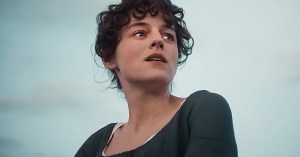What to Watch With Belgravia Star Alice Eve
When she's not causing trouble in Julian Fellowes' new series, the British actress enjoys serious dramas and light comedies.

(Photo by Vera Anderson/WireImage)
To know the works of Julian Fellowes, such as Gosford Park and Downton Abbey, is to believe that the worst thing that could happen to British aristocratic society of a certain era is a bored rich woman.
Enter Susan Trenchard of the new Epix miniseries, Belgravia. Played by Alice Eve in Fellowes’ adaptation of his own novel, Susan is a ladder-climber who is able to suss out a situation with a twitching cat-like eye for how it will best benefit her. Married to the entitled and uninspiring Oliver Trenchard (Richard Goulding), Susan yearns for any kind of excitement or purpose and considers any slight – such as her mother-in-law Anne (Tamsin Greig) neglecting to make her a plus-one at the afternoon tea hosted by a lady of higher standing – to be the utmost form of disrespect.
Her role in the lavish period-set series is a different sort for Eve, who is perhaps better known to U.S. audiences for Starter for 10, Men in Black III, Star Trek Into Darkness, and, most recently, Bombshell.
Ahead of Belgravia’s premiere this Sunday on Epix, we chatted with the UK-based Eve about playing Susan and what programs she watches when she’s not causing trouble in 19th-century London.

(Photo by Channel 4)
What are you watching?
So, you know this is a rocky time. I find that, to go to sleep, one likes to be soothed. And, fittingly or not, I find myself being soothed by two shows. One is The Windsors (pictured) on Netflix [in the U.S.] and the other is Upstart Crow, which is also on Netflix [in the U.S.]. They’re both highly British comedy spoof shows.

(Photo by BBC / Courtesy: Everett Collection)
What is on your DVR?
I don’t have a DVR. I have like Apple TV, Netflix, and kind of BBC … But the shows that I buy and have always bought include Keeping Up With the Kardashians and Fawlty Towers.

(Photo by Amazon)
What is in your streaming queue?
I’m certainly a fan of Maisel, which is over on Amazon. I have to say, in terms of my viewing habits, I’m much more in tune with the Criterion Collection on iTunes and purchase Ingmar Bergman movies, so I don’t really spend too much time on repeating shows. But I do still enjoy Comedians in Cars Getting Coffee [on Netflix]. When it comes to shows, I like to lighten my tone. With movies, I like to be quite serious.

(Photo by HBO)
What is coming soon that you can’t wait to see?
I was enjoying that Al Pacino show that he did on Amazon, Hunters. I’m really looking forward to my friend Zoe Kazan’s new HBO show, The Plot Against America, when it comes here.

(Photo by Carnival Films)
Whitney Friedlander for Rotten Tomatoes: How did you get cast in this project and were you a big fan of Julian Fellowes’ work before this?
I got a letter from the producers and they said, “Would you like to do it?” That was it.
I was a big fan of Gosford Park, so I knew Julian from his work on that. And when I read the book for this, Belgravia, when they offered it to me, I then was able to sit down and really enjoy Downton and enjoy the comfort that it gives as a show.
So much of how you play Susan is in subtlety, like the way she scans a room at a party or makes a silent commentary about her in-laws. How did you decide how to do this?
That’s definitely an outside-in thing, and I definitely inhabited Susan from the inside-out. And I think that’s just how she manifested. The thing about the 19th century was [that] everything was observed so intricately. Every movement and every glance and every gesture was meant so much was so loaded; for example, the etiquette teacher explained to us that when we were having dinner, you couldn’t touch your hair, you couldn’t touch your face, you couldn’t do something with your napkin, you couldn’t lift your forks too high or your knife too high, you couldn’t put your elbow on the table because everything, kind of, was mannered and was a way of expressing something. And so there was very limited movement, and there was very limited gesture. So she kind of found her personality, I guess, as you noticed, in like a smaller space.

(Photo by Carnival Films)
How much of these mannerisms did you know already? Americans always think that all British people know these etiquette guidelines.
Well, I think some of it is intrinsic. I think there is definitely like a cultural understanding of the history and the history of repression and the history of expression. And then I think a lot is learned. I mean, I really enjoyed exploring.
I went to Oxford, but certainly people who go to RADA — to the Royal Academy — to study drama, they’re really good. They go through like a course in what sound was like and of course in walking … and so there is a way to study it. But I learned it through the etiquette teachers and through reading.
How much did you know about this time in British history anyway?
I read a lot around it when I started the job, but also in my course at Oxford, we did from 1832 to the present day, which was modern literature. And so that’s Queen Victoria’s realm. She came to the throne in 1832 … so I certainly had an idea of her influence on literature of the time and the [Alfred] Tennyson, the [Robert] Browning the heavy, kind of elegiac. I had an understanding of the Gothic nature of the architecture, but, I think in terms of society, I learned that since I got the job.

(Photo by Carnival Films)
Susan has more depth than her meddling ways; for instance, she and Oliver don’t have children. She tells her mother-in-law at one point that she does want them. Is she lying? It’s hard to know if we want to trust her.
I certainly trusted her when I played her, but I think that she wants a child. You could maybe judge her motivations for wanting a child, but I think she does want one. I think maybe she is bored. And I think that there’s very little to do for her, because she’s not allowed to integrate into society and, therefore, kind of conduct relationships. And she can’t go anywhere without her husband, so she doesn’t have entertainment.
As Julian said, himself, to me, the only ways for women at the time to divert themselves were society and children. So, she had sort of access to neither, but I also think her biological clock was kind of ticking.

(Photo by Epix/Carnival Films)
Much like with Downton, a lot of what happens on Belgravia involves how much the elite can trust their support staff — even when it comes to getting dressed or undressed.
This was a long conversation that we had running through the whole of the show: the reality of a woman getting dressed on her own … I mean, they couldn’t use the restroom on their own. It was Selfridges, the department store, that had the first female restroom [around when] clothes started to change. Because you would need assistance to even pee. So, it’s a big one.
I know you’ve appeared in a few adaptations like the Amazon miniseries Ordeal by Innocence, which is based on the Agatha Christie story. But you haven’t done a ton of period work on screen. Would you like to do more?
Yes, it’s thrilling. I mean, the thrilling part of doing this was playing a character so kind of complex and well-imagined by Julian. I don’t want to do roles for the sake of them … usually, I just want to play roles that give the woman her do and where her complexities and all her motivations are taken into account. Wherever that comes, I’m thrilled to be able to take that on.
Belgravia premieres on Sunday, April 12 at 9/8C on Epix.





